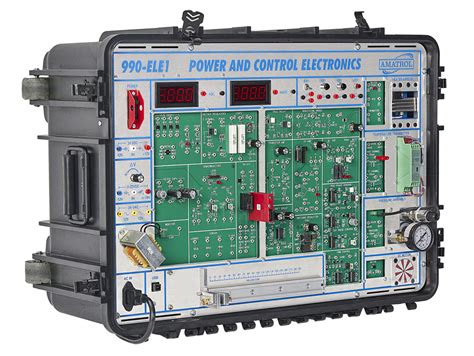Electronic control systems are systems of electronics that control the operation of a machine or process. They are used in a wide variety of applications, from simple consumer products to complex industrial machinery. Electronic control systems can be used to automate tasks, improve efficiency, and reduce costs.

Types of Electronic Control Systems
There are many different types of electronic control systems, each with its own unique set of features and capabilities. Some of the most common types of electronic control systems include:
- Analog control systems use analog signals to control the operation of a machine or process. Analog signals are continuous signals that can vary in amplitude or frequency. Analog control systems are relatively simple and inexpensive to design and build, but they can be less accurate and less reliable than digital control systems.
- Digital control systems use digital signals to control the operation of a machine or process. Digital signals are discrete signals that can only take on a finite number of values. Digital control systems are more accurate and more reliable than analog control systems, but they can be more complex and more expensive to design and build.
- Hybrid control systems use a combination of analog and digital signals to control the operation of a machine or process. Hybrid control systems offer the advantages of both analog and digital control systems, but they can be more complex and more expensive to design and build.
Applications of Electronic Control Systems
Electronic control systems are used in a wide variety of applications, including:
- Consumer products: Electronic control systems are used in a wide variety of consumer products, such as televisions, DVD players, and microwave ovens. These systems control the operation of the product, such as the volume of the sound or the temperature of the food.
- Industrial machinery: Electronic control systems are used in a wide variety of industrial machinery, such as robots, CNC machines, and conveyor belts. These systems control the operation of the machinery, such as the speed of the robot or the position of the conveyor belt.
- Medical devices: Electronic control systems are used in a wide variety of medical devices, such as pacemakers, defibrillators, and infusion pumps. These systems control the operation of the device, such as the rate of the pacemaker or the flow rate of the infusion pump.
- Transportation: Electronic control systems are used in a wide variety of transportation vehicles, such as cars, trucks, and airplanes. These systems control the operation of the vehicle, such as the speed of the car or the direction of the airplane.
Benefits of Electronic Control Systems
Electronic control systems offer a number of benefits over traditional mechanical control systems, including:
- Improved accuracy: Electronic control systems can be programmed to control the operation of a machine or process with a high degree of accuracy. This can lead to improved quality and consistency in the final product.
- Increased efficiency: Electronic control systems can be used to optimize the operation of a machine or process, resulting in increased efficiency. This can lead to reduced energy consumption and increased productivity.
- Reduced costs: Electronic control systems can be used to reduce the cost of manufacturing and operating a machine or process. This can lead to lower prices for consumers and higher profits for businesses.
Challenges of Electronic Control Systems
Electronic control systems also pose a number of challenges, including:
- Complexity: Electronic control systems can be complex to design and build. This can make them expensive and time-consuming to develop.
- Reliability: Electronic control systems can be less reliable than mechanical control systems. This can lead to downtime and lost productivity.
- Security: Electronic control systems can be vulnerable to cyberattacks. This can lead to unauthorized access to the system or to the theft of sensitive data.
Future of Electronic Control Systems
The future of electronic control systems is bright. As technology continues to advance, electronic control systems will become more powerful, more reliable, and more secure. This will lead to new and innovative applications for electronic control systems, and will help to make our lives easier, more efficient, and more secure.
Here are some of the key trends that are driving the future of electronic control systems:
- The increasing use of artificial intelligence (AI): AI is being used to develop new and innovative ways to control machines and processes. This is leading to the development of electronic control systems that are more intelligent, more adaptable, and more efficient.
- The increasing use of the Internet of Things (IoT): The IoT is connecting billions of devices to the Internet. This is leading to the development of electronic control systems that can be controlled remotely and that can communicate with each other.
- The increasing use of cloud computing: Cloud computing is making it easier to develop and deploy electronic control systems. This is leading to the development of electronic control systems that are more scalable, more flexible, and more cost-effective.
These trends are driving the future of electronic control systems, and they are making it possible to develop new and innovative applications for electronic control systems. These applications will help to make our lives easier, more efficient, and more secure.
Conclusion
Electronic control systems are essential to the modern world. They are used in a wide variety of applications, from simple consumer products to complex industrial machinery. Electronic control systems offer a number of benefits over traditional mechanical control systems, including improved accuracy, increased efficiency, and reduced costs. However, electronic control systems also pose a number of challenges, including complexity, reliability, and security.
The future of electronic control systems is bright. As technology continues to advance, electronic control systems will become more powerful, more reliable, and more secure. This will lead to new and innovative applications for electronic control systems, and will help to make our lives easier, more efficient, and more secure.
